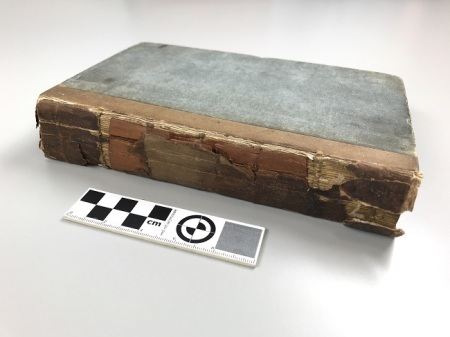Rare 'Slave Bible' used to 'legitimize slavery' goes on display in Dutch museum

A rare edition "Slave Bible" — a heavily-edited version of Scripture with omitted references to anything that could promote freedom among enslaved people — is on display as part of a Dutch exhibition on gospel music.
One of only three known surviving copies, the Bible titled "Select parts of the Holy Bible for the use of the Negro Slaves in the British West-India Islands" was published in London in 1807 for Christian missionaries.
It's now part of an exhibition called "Gospel: Musical Journey of Spirit and Hope" at the Museum Catharijneconvent in Utrecht, Netherlands, known as the Dutch national museum for the art, culture and history of Christianity.
Among 12,000 books donated to the University of Glasgow by insurance broker William Euing in 1874, the Slave Bible was used by British missionaries in the British West Indies, among other places.
According to a museum spokesperson, it was in those locations that "Bible texts were used to legitimize slavery and other texts were censored and kept away from the enslaved."
"However, these measurements did not prevent faith from taking root on the plantations," the spokesperson added. "The passages about freedom that were omitted turned up in spirituals, the songs of enslaved people in the United States. We are very fortunate and proud that we can show this impressive object in our exhibition."
Julie Gardham, a senior assistant librarian at the University of Glasgow Library, said the "important and scarce" Bible is part of Scottish philanthropist William Euing's renowned library and is "one of some 3,000 Bibles that he collected in many different editions and languages."
While a standard King James Version Bible contains 1,189 chapters, the Slave Bible has only 282, among other differences.
"In omitting all references to freedom, it is a powerful and chilling reminder of how white Christians manipulated and misused even sacred texts to control the enslaved and legitimize slavery," said Gardham.
That includes the removal of the fifth chapter of Exodus, in which Moses demands Pharaoh set the Israelites free from captivity in Egypt before God makes way for them to leave.
The entire book of Jeremiah — which references "making … people work for nothing, not paying them for their labor" — is also omitted.
Among the removed verses is Exodus 21:16, which reads, "And he that stealeth a man, and selleth him, or if he be found in his hand, he shall surely be put to death."
Other passages, however, such as Ephesians 6:5, which reads, "Slaves, obey your earthly masters with respect and fear, and with sincerity of heart, just as you would obey Christ," are included in the book.
The copy itself has seen better days, however. The Bible's condition so deteriorated it had to be treated by the university's conservation team ahead of its transfer to the Netherlands so that it could be loaned for exhibition with minimal risk of further damage.
"The Bible had detached boards, splits in the sewing, and extensive losses to the fragile paper covering material. This meant that the Bible's condition could quickly worsen with very little handling," Keira McKee, a book conservator at the University of Glasgow, said.
McKee added that the conservation treatment stabilized each of these issues through a combination of linen threads and Japanese paper, retaining as much original material as possible.
The Slave Bible will remain on display in Utrecht until January 2023.
While the Bible contains numerous references to slavery, theologians have argued that context is essential when looking at Bible verses that appear to favor slavery.
In a video on the YouTube apologetics channel Reasons to Believe, Pastor Gavin Ortlund of First Baptist Church of Ojai, California, says, "you have to look at the whole of Scripture to say that there might be something that's accommodated to in one passage, but the whole of the Bible gives you a different picture."
"I like to go all the way to the Gospel and say what's the biggest picture we can get on the whole of Scripture and kind of the trajectory of what God is doing throughout redemptive history," he continued.
"A good case can be made that from the sum total teaching of Scripture, any form of slavery is condemned and that we have good grounds to oppose all forms of slavery."
Ian M. Giatti is a reporter for The Christian Post. He can be reached at: ian.giatti@christianpost.com.





















